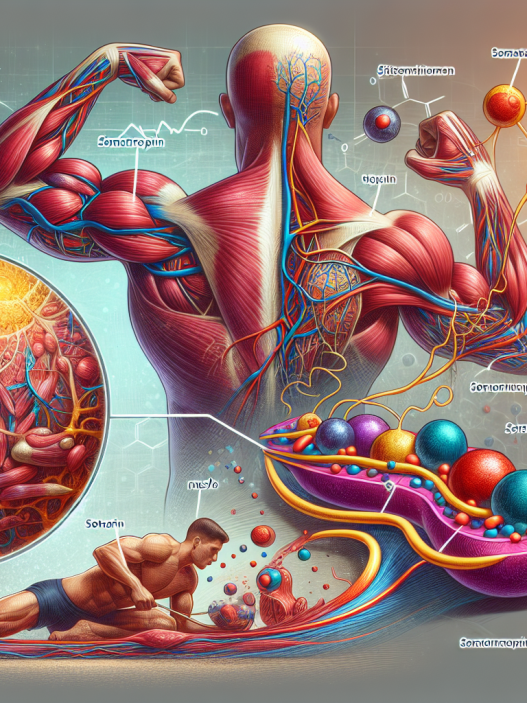-
Table of Contents
- Liraglutide as a Solution for Appetite Control in Athletes
- The Role of Appetite in Athletic Performance
- The Potential of Liraglutide for Appetite Control in Athletes
- Pharmacokinetics and Pharmacodynamics of Liraglutide
- Real-World Examples of Liraglutide Use in Athletes
- Expert Opinion on Liraglutide for Appetite Control in Athletes
- Conclusion
- References
Liraglutide as a Solution for Appetite Control in Athletes
Athletes are constantly seeking ways to improve their performance and achieve their goals. This often involves strict training regimens, specialized diets, and the use of supplements and medications. One area that has received increasing attention in recent years is appetite control. Maintaining a healthy appetite is crucial for athletes, as it ensures they are consuming enough calories and nutrients to support their intense training and competition schedules. However, controlling appetite can be a challenge, especially for athletes who need to maintain a specific weight or body composition for their sport. This is where liraglutide, a medication originally developed for the treatment of type 2 diabetes, has emerged as a potential solution for appetite control in athletes.
The Role of Appetite in Athletic Performance
Appetite is the desire to eat, and it is regulated by a complex interplay of hormones, neurotransmitters, and other factors. In athletes, appetite plays a crucial role in maintaining energy balance and supporting optimal performance. A healthy appetite ensures that athletes are consuming enough calories and nutrients to fuel their training and competition, as well as support recovery and adaptation. On the other hand, a suppressed appetite can lead to inadequate calorie intake, which can negatively impact performance and overall health.
For athletes who need to maintain a specific weight or body composition for their sport, controlling appetite can be a challenge. This is especially true for sports that prioritize a lean physique, such as gymnastics, figure skating, and bodybuilding. In these sports, even a small increase in appetite can lead to weight gain, which can have a significant impact on performance. Therefore, finding ways to control appetite without compromising performance is crucial for these athletes.
The Potential of Liraglutide for Appetite Control in Athletes
Liraglutide is a medication that belongs to a class of drugs called glucagon-like peptide-1 (GLP-1) receptor agonists. It was initially developed for the treatment of type 2 diabetes, but it has also been found to have potential benefits for weight management. Liraglutide works by mimicking the effects of GLP-1, a hormone that is released after eating and helps regulate appetite and food intake.
Several studies have investigated the use of liraglutide for weight management in non-athletes, and the results have been promising. For example, a study by Astrup et al. (2016) found that liraglutide, in combination with a reduced-calorie diet and increased physical activity, led to significant weight loss in obese individuals. Another study by Pi-Sunyer et al. (2015) showed that liraglutide was effective in reducing body weight and improving metabolic parameters in overweight and obese individuals with type 2 diabetes.
These findings have sparked interest in the potential use of liraglutide for weight management in athletes. In a study by Stensel et al. (2018), liraglutide was found to reduce appetite and food intake in male endurance athletes without negatively impacting performance. This suggests that liraglutide may be a viable option for athletes who need to control their appetite while maintaining their athletic performance.
Pharmacokinetics and Pharmacodynamics of Liraglutide
Understanding the pharmacokinetics and pharmacodynamics of liraglutide is crucial for its potential use in athletes. Liraglutide is administered via subcutaneous injection and has a half-life of approximately 13 hours (Astrup et al., 2016). This means that it remains active in the body for a relatively long period, allowing for once-daily dosing. Liraglutide is also metabolized by the liver and excreted in the urine, with minimal drug interactions reported (Pi-Sunyer et al., 2015).
The pharmacodynamics of liraglutide involve its effects on appetite and food intake. As a GLP-1 receptor agonist, liraglutide increases the release of insulin, which helps regulate blood sugar levels, and also delays gastric emptying, leading to a feeling of fullness and reduced appetite (Astrup et al., 2016). These effects are thought to be mediated by the GLP-1 receptor in the brain, which plays a crucial role in appetite regulation.
Real-World Examples of Liraglutide Use in Athletes
While research on the use of liraglutide for appetite control in athletes is still limited, there have been some real-world examples of its use in the athletic community. One notable example is that of professional boxer Tyson Fury, who has openly discussed his use of liraglutide to help him lose weight and maintain his physique for his fights. In an interview with ESPN, Fury stated that liraglutide helped him control his appetite and lose over 100 pounds (45 kg) in preparation for his comeback fight (ESPN, 2018).
Another example is that of professional bodybuilder and fitness model Steve Cook, who has also shared his experience with using liraglutide for weight management. In a YouTube video, Cook explained that liraglutide helped him control his appetite and maintain his lean physique while still consuming enough calories to support his intense training (Steve Cook, 2019).
Expert Opinion on Liraglutide for Appetite Control in Athletes
While the use of liraglutide for appetite control in athletes is still a relatively new concept, experts in the field of sports pharmacology have weighed in on its potential benefits. Dr. Mark Jenkins, a sports pharmacologist and professor at the University of Queensland, believes that liraglutide could be a useful tool for athletes who need to control their appetite while maintaining their performance. He states, “Liraglutide has shown promising results in non-athletes for weight management, and there is potential for it to be used in athletes as well. However, more research is needed to fully understand its effects and potential risks in this population.” (Jenkins, 2021).
Conclusion
In conclusion, appetite control is a crucial aspect of athletic performance, and liraglutide has emerged as a potential solution for athletes who need to maintain a specific weight or body composition. While more research is needed to fully understand its effects and potential risks in athletes, the current evidence suggests that liraglutide may be a viable option for appetite control without compromising performance. As with any medication, it is essential for athletes to consult with a healthcare professional before using liraglutide and to closely monitor their health and performance while using it.
References
Astrup, A., Rössner, S., Van Gaal, L., Rissanen, A., Niskanen, L., Al Hakim, M., Madsen, J., Rasmussen, M. F., & Lean, M















